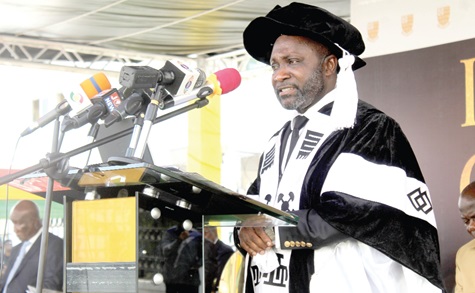The Director of the Ghana School of Law (GSL), Barima Yaw Kodie Oppong, has stressed the need for the school to be exempt from paying 25 per cent of its internally generated funds (IGF) to the government.
In line with that, he has appealed to the Speaker of Parliament to act on their request to be exempt from such payments.
Speaking at a ceremony to induct new students admitted to the professional law course in Accra yesterday, the director explained that the school had been paying 25 per cent of its IGF to the government but received little in return for the expansion of infrastructure.
By waiving the 25 per cent, Barima Oppong, who is also the Director of Legal Education, said the school would now be able to channel its resources into infrastructure expansion to admit more students to cater for the legal needs of the public.
He said since the establishment of GSL in 1958, the school had been the only institution that pays part of its IGF to the government.
For instance, the director said last year, the school paid in excess of GH¢12 million to the government, adding “until recently, the government was taking 34 per cent of our IGF”.
The event was on the theme: “The importance of ethics in the advancement of legal education and practice”.
![]()
The students
Justice A. Asumah Oppong, a Justice of the High Court, led the 994 LLB students who passed the entrance exam and were duly admitted by the Ghana School of Law to take their oaths.
Plea
Barima Oppong pleaded with the Speaker, Alban Sumana Kingsford Bagbin, to act on the request for the waiver which he said was before the House “so that at the next induction you will see massive construction works”.
“So I am very certain that within a short time you will be able to make a case for us not only to get all our IGF, but also be on the back of other financial instruments to provide for us the needed accommodation,” the director added.
Adherence to ethics
Mr Bagbin called on the students to avoid the behaviour likely to bring the law profession into disrepute.
He urged the students to familiarise themselves with ethical principles of selflessness, dignity, integrity, honesty, truthfulness, probity and accountability at an early stage to help inspire trust in the legal profession.
“The aspiration is for students to be truly worthy of the noble title of “lawyer” at the conclusion of their courses, contributing positively to the legal community.
“The law is a powerful tool; its strength is derived from the ethics guiding its use.
Therefore, aspiring lawyers are urged to aspire to leave a legacy of ethical conduct, inspire trust, and serve as role models,” the Speaker added.
Advice
In a speech read on behalf of the Attorney-General and Minister of Justice, Godfred Yeboah Dame, by the Solicitor-General, Mrs Helen Akpene Awo Ziwu, he said the advent of technology had made ethical decision-making more complex in recent times.
He said that had led to multiple scandals and increased rebellion, among other challenges, hence the need for law students to be ethically conscious before entering the legal profession in order not to lose their bearing.
“The bottom line is that you need to develop a strong ethical education which has become more important than any time in history.
For his part, the President of the Ghana Bar Association, Yaw Acheampong Boafo, also admonished the students to be disciplined beyond classroom examinations.

